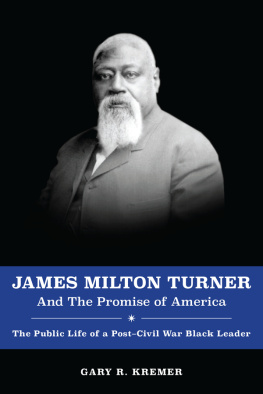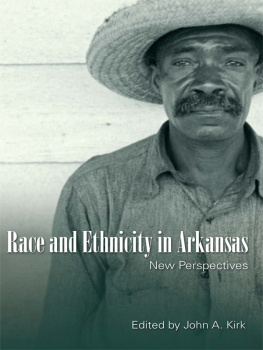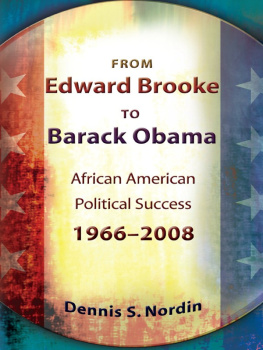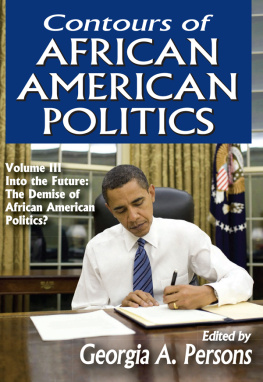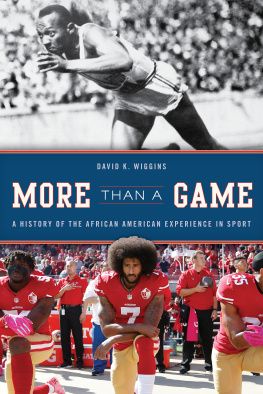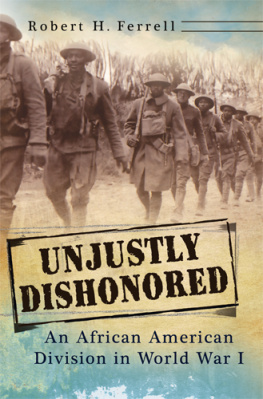Acknowledgments
I have incurred many debts over the past four decades doing research for and writing the essays included in this anthology. I apologize in advance for my inevitable failure to remember all of those individuals who have assisted me through the years.
I want to begin by thanking University of Missouri Press Editor-in-Chief and Associate Director Clair Willcox. This book was his idea. I am grateful to him for encouraging me to pull together these essays and for offering helpful critical advice along the way. I am also indebted to two anonymous readers for the Press whose suggestions helped me to produce a final product that is much improved over my initial effort. I also appreciate the help of Press staff members Jane Lago, Mary Conley, Greg Haefner, Kristi Henson, and especially managing editor Sara Davis and my editor, Pippa Letsky.
Through the years, countless individuals have invited me in to their homes so that I could listen to their stories about Missouris rich African American heritage. I am especially indebted to the Whitley Sisters (Irene Whitley Marcus, Geneva Whitley Carple, and Gertrude Whitley Bardwell). Likewise, sisters Vivienne Starks Smith and Yvonne Starks Wilson were unfailingly generous with their time. Leonard Pryor and Mamie Hughes also made themselves and their rich collections of photographs and documents available.
I have taught thousands of students since I first stepped into a Lincoln University classroom as an instructor in 1972. Often, those students proved an important sounding board for me as I talked about whichever research project I was engaged in at the time. Many of those students asked questions and offered suggestions that helped to inform and shape my research and writing. In a few instances, some of them engaged directly in research with and for me. I am grateful to all who helped in any way, especially students and colleagues who co-authored some of the essays contained in this collection: Lynn Morrow, Linda Rea Gibbens, Trina Philpot, Cindy M. Mackey, Antonio F. Holland, Evan P. Orr, and Patrick J. Huber. Likewise, during my teaching career at William Woods University, that schools president, Dr. Jahnae H. Barnett, went out of her way to encourage my research and writing. I am grateful to her for her support.
Beginning in 1978, and off and on for some two decades, the State Historic Preservation Office (SHPO) supported my effort to undertake cultural resource surveys of African American historic sites in Missouri. I appreciate the SHPOs assistance. I also received support from the Missouri Humanities Council via their Scholar-in-Residence grants. That support was critical to the work I did on the African American community of Arrow Rock, in particular.
For a number of years during the 1990s, the Missouri State Museum based its Black History Month exhibits on my work in the states African American communities. That effort enhanced my ability to collect oral histories, photographs and documents. I appreciate the museums support of that effort. I am especially indebted to Missouri State Museum historian John Viessman who worked with me on those projects.
Through the years, librarians and archivists have patiently answered my research questions and helped me find answers, even when answers were not easily obtainable. I am especially indebted to Ithaca Bryant and the staff of the Inman E. Page Library at Lincoln University, the staffs of Dulany Library at William Woods University, the Missouri State Archives, the Missouri History Museum, the Kansas City Public Library, the St. Louis Public Library, and the State Historical Society of Missouri. Missouri State Archives Local Records Director Lynn Morrow and his successor John Korasick and local records archivists Rebecca Weber Bowen and Mike Everman were especially helpful in bringing to my attention newly available public record groups.
All of the essays in this collection have appeared in one form or another in other publications. I appreciate the permission to reprint those essays from the following institutions: the State Historical Society of Missouri, ABC-CLIO/Greenwood Press, Department of American Studies at the University of Kansas, Department of African and Afro-American Studies Program at Washington University, Kansas City Regional History Institute at the University of MissouriKansas City, and the Missouri Folklore Society.
I could not have completed this book without the help of a number of my co-workers at the State Historical Society. Gerald Hirsch and Kristen Bland Anderson led the effort to scan, OCR and correct the original essays that formed the basis of the book. Kristen likely spent more time on this book than I did, and she was unfailingly cheery, even when I asked more than I had a right to of her. She was assisted by Christina George and Katherine Fallon. Anne Cox worked her usual magic on the photographs in the book. Lynn Wolf Gentzler, John Brenner and Laura Jolley read the books Prologue and offered helpful suggestions for improvement. Jeneva Pace helped to keep me on task so that the book could be completed in a timely manner. The Executive Committee of the Board of Trustees of the State Historical Society of Missouri, and especially President Stephen N. Limbaugh Jr., has been unfailingly supportive of my research and writing. To all of my SHSMO colleagues, thank you very much.
Finally, I am indebted to my family for allowing me the time and freedom to pursue my research interests over the course of more than four decades. I wish to thank my wife, Lisa, son Randy and his wife Michaela, daughter Sharon and her husband Travis Bax, and daughter Rebecca and her husband Jeffrey Dazey. I am also grateful to grandchildren Dustin, Brooke and Bladen Kremer, Logan, Kaden, Saylor and Halston Bax, and Brennan Dazey for inspiring me to try to shape their future by discovering and preserving our collective past.
Any deficiencies that remain in this book can be blamed on my own inadequacies rather than the quality of all of the good help I have received.
Gary R. Kremer
Prologue
Race and Meaning in Missouri History
A Personal Journey
The problem of the twentieth century is the problem of the color-line, the relation of the darker to the lighter races of men
W. E. B. DuBois, The Souls of Black Folk (1903)
I have been deeply interested in the color line for most of my life. Like W. E. B. DuBois, I think that the dominant problem of the twentieth century, certainly for Americans, has been race. For nearly half a century, I have devoted the bulk of my professional life to studying, researching, and writing about race in Missouri history. That is an improbable journey for someone who grew up during the 1950s in one of the most homogenous all-white communities in the state. I knew one African American as a child, a middle-aged man named Oscar Toad Anthony, a World War II veteran who lived in the small mid-Missouri town of Chamois in northeastern Osage County. Although I did not know it at the time, Toad was the last member of what had once been a thriving African American community of hundreds of persons in and near Chamois that dated to the antebellum days of slavery.


 This paper meets the requirements of the American National Standard for Permanence of Paper for Printed Library Materials, Z39.48, 1984.
This paper meets the requirements of the American National Standard for Permanence of Paper for Printed Library Materials, Z39.48, 1984.
